|
November 9, 2017
Pensions Belong to the Workers by
Right
Steelworkers and Allies Demand Action
to Stop the Legalized Theft
of Their Pensions
PDF
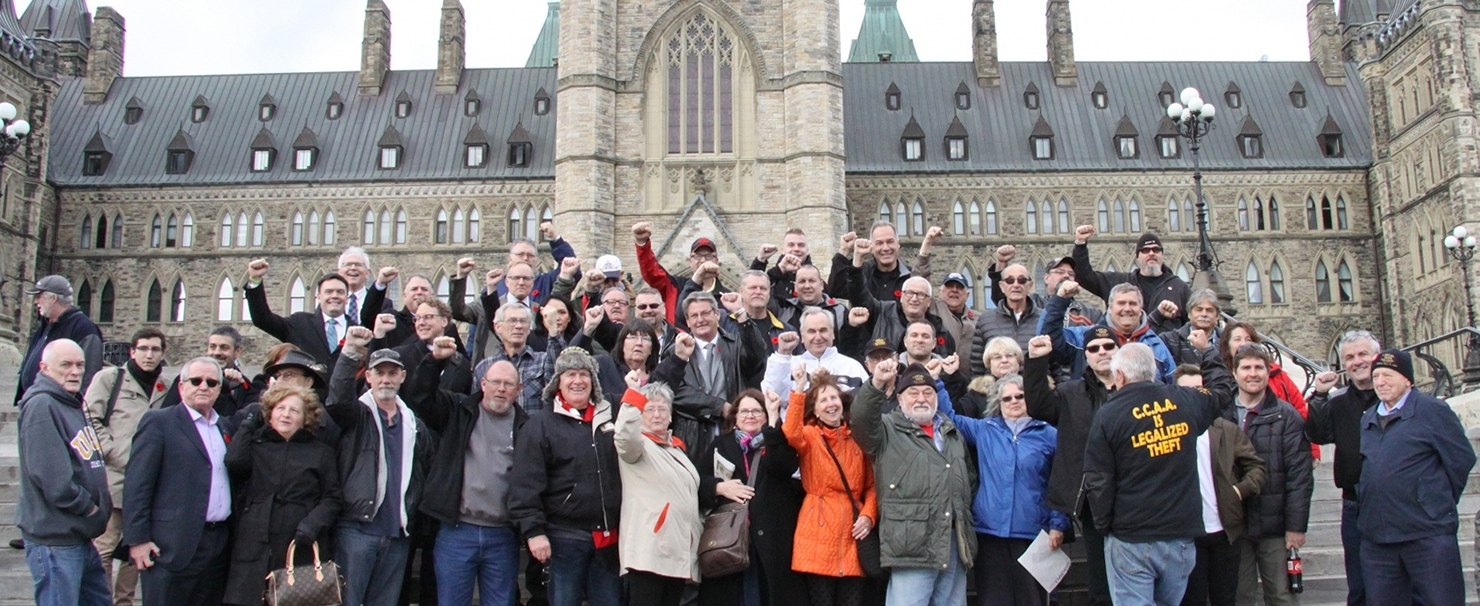
Steelworkers and their allies outside the Parliament buildings,
November 6, 2017.
Pensions Belong to the Workers by Right
• Steelworkers and Allies Demand Action to Stop
the Legalized Theft
of Their Pensions
• Opening
Remarks for Bill C-384, An Act to
amend the Bankruptcy and Insolvency Act and the Companies’ Creditors
Arrangement Act
- Scott Duvall MP for Hamilton Mountain
Ontario College
Employer
Council Forced Strike Vote
• Negotiate Don't Dictate!
• An Increase in Ontario College Funding is
Just and Necessary for a
Modern Society - David Starbuck
• Statement of OPSEU College Faculty
Negotiating Team - November 6, 2017
• Queen's Park Rally Expresses Support for
Striking College Faculty
Pensions Belong to the Workers by Right
Steelworkers and Allies Demand Action to Stop the
Legalized Theft of Their Pensions
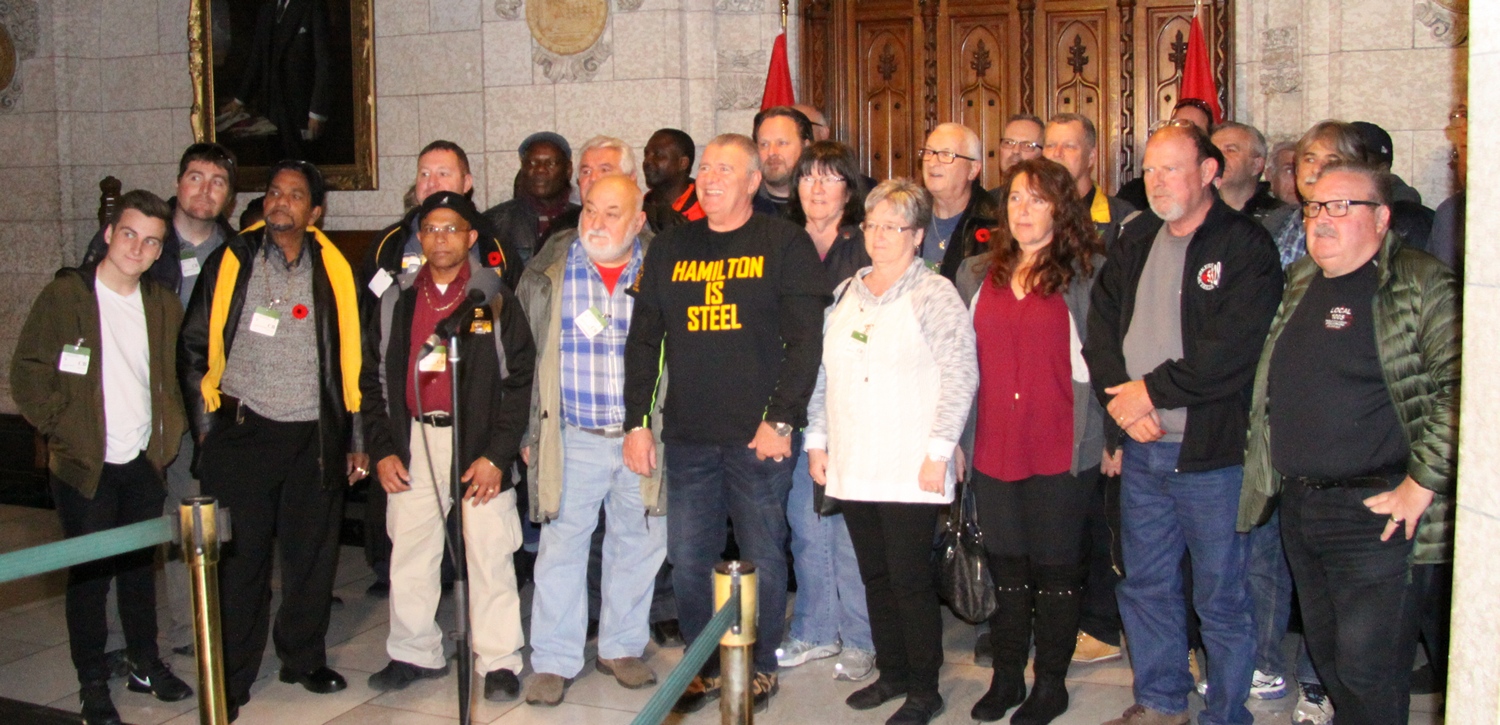
Inside the parliament buildings.
Two busloads of steelworkers and their allies from
Hamilton and Toronto converged on Parliament Hill on November 6,
to demand an end to the legalized theft of their pensions and benefits
under cover of the criminal Companies'
Creditors
Arrangement
Act (CCAA). Workers across Canada are fed
up with the continuing CCAA
attacks on what belongs to them by right. United Steelworkers (USW)
Local 1005, which has led the fight against the CCAA, organized
the bus from Hamilton along with the USW District 6 Hamilton. Also
participating from the Hamilton area were steelworkers locals
4153, 8214, 16506, and 5328. The Firefighters'
local, the Steelworkers
Organization of Active Retirees (SOAR) and the Congress of Union
Retirees of Canada (CURC) also sent delegates from Hamilton.
The workers filled the galleries of Parliament to
witness the introduction of a private member's bill by MP for Hamilton
Mountain Scott Duvall to amend the bankruptcy and insolvency
legislation. Duvall, also the NDP Pensions Critic, says his bill
introduces changes to the CCAA that will stop this particular form of
legalized theft of workers' pensions. If passed, the amended
legislation would require companies under CCAA insolvency protection to
fund pension plans fully before paying the claims of others from the
assets of the company. The amendment also puts severance payments to
workers ahead of other claims and prevents CCAA judges from allowing
companies to stop paying medical benefits while under bankruptcy
protection.
In speaking to the assembled workers on the steps of
Parliament before entering the galleries, Duvall said he knew first
hand the effects of the CCAA as he was a worker at Stelco when it
entered the CCAA for the first time in 2004. "I have the utmost pride
in the steelworkers from my city who have worked so hard since then to
defend the pensioners not only in their own local but all workers who
have been affected by the CCAA," he said. "Likewise, the International
Association of Machinists and Aerospace Workers (IAMAW) have been front
and centre in drafting and supporting the amendments I am proposing in
my bill," he said. Duvall introduced Stan Pickthall, the General Vice
President of the IAMAW to address the crowd. Pickthall said the changes
to the CCAA are important to all workers in Canada. This travesty of
taking workers' pensions from them after having worked their entire
lives has to stop. Workers perform their duties on the job and earn the
right to retire in dignity, Pickthall said.
|

Stan Pickthall, General Vice President of IAMAW, speaks to crowd.
Scott Duvall is on the left.
|
Ken Neumann, USW National Director; Marty Warren, USW
District 6 Director; Larry Russo, Executive Vice President of the
Canadian Labour Congress, and Jagmeet Singh, leader of the federal NDP
also addressed the
crowd. They denounced the hardships imposed on Canadian retirees
through the CCAA, while those same CCAA courts award bonuses to
the executives of failed companies. They pledged their support for MP
Duvall's "Campaign to Stop the Organized Theft of Workers' Pensions"
and called on everyone to lobby their Members of Parliament to support
his bill.
The workers and retirees who travelled all the way from
Hamilton and Toronto to witness the introduction of Duval's bill
entered the parliamentary galleries during question period. A full
house of MPs were present when Duvall informed them
through a question, that he would introduce his CCAA bill immediately
after
question period. To the shock of those in the galleries, when question
period ended the vast majority of MPs quickly deserted the chamber,
including many NDP members. This left Duvall to present his bill to a
virtually empty House of Commons, except for the workers in the
galleries.
MP Duvall, undeterred by the obvious disrespect and
disinterest of other MPs for such an important matter, held a press
conference and reception, which were likewise mostly ignored by the
media. He thanked everyone, in particular the steelworkers from his
hometown of Hamilton where he worked for years at Stelco, for their
more than
decade long struggle to bring attention to the organized theft of
workers' pensions and the need to put a stop to it. Despite the cold
reception in Parliament, he called on everyone to go all out to have
other MPs support his bill.
For details on Bill C-384 click here.

Opening Remarks for Bill C-384,
An Act to amend the
Bankruptcy and Insolvency Act and the Companies’ Creditors Arrangement
Act
- Scott Duvall -
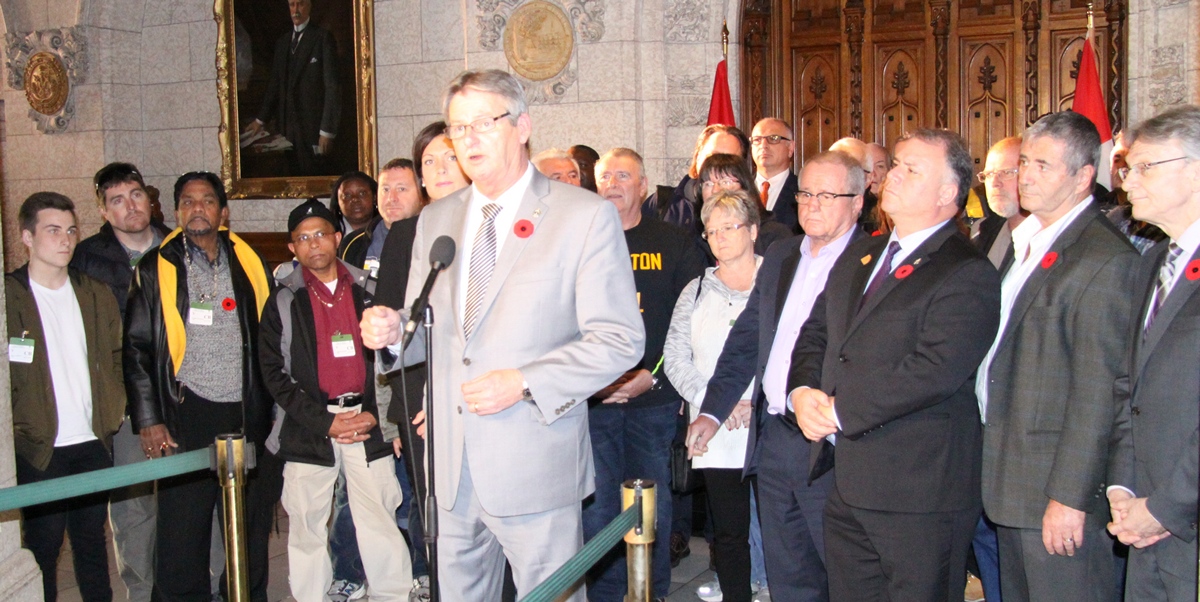
Scott Duvall holds press conference, November 6, 2017, after
introducing private
member's Bill C-384.
I rise today to introduce a private member's bill
titled, An act to amend the Bankruptcy and Insolvency Act and the
Companies' Creditors Arrangement Act. This bill will amend the Bankruptcy
and
Insolvency
Act
and the CCAA so that companies will have to
bring any pension plan fund to 100 per cent before paying any
other secured creditors. It also makes amendments to require companies
to pay any termination or severance pay owing before paying any secured
creditors.
Other amendments will prevent a company from stopping
the payment of any post-retirement benefits during any proceedings
under the BIA or CCAA. These amendments will inject some fairness into
a process that often sees the interests of workers, retirees, and their
families placed behind all others.
We must fix the imbalances in current legislation and
provide Canadian workers, retirees, and their families with the
protection they expect and deserve. I am hopeful that all my colleagues
in Parliament will put aside their partisan differences and support
this bill. Canadian workers, retirees, and their families deserve no
less.

Ontario College Employer Council Forced
Strike
Vote
Negotiate Don't Dictate!

On November 6 while negotiations were progressing with
the union representing Ontario College Faculty the Colleges Employer
Council (CEC), the bargaining agent for the 24 Ontario colleges in
negotiating collective agreements with unionized staff, abruptly asked
the Ontario Labour Relations Board (OLRB) to schedule a vote on an
offer which
excluded much of the progress that had been made in the negotiations.
According to the union this was done in response to union proposals on
academic freedom. Under existing labour law the employer can force a
vote of the members of a union on an offer without the tentative
agreement of the negotiators representing the union.
 The union informs that
under the Colleges Collective
Bargaining Act (CCBA),
votes by unionized college employees must be
supervised by the OLRB, meaning OLRB
staff must be in attendance for votes at more than 100 campuses across
the province. A strike vote under the CCBA by college faculty in
September took two weeks to organize and complete. The CEC's forced
vote will keep the strike going instead of trying to reach a negotiated
settlement. The union informs that
under the Colleges Collective
Bargaining Act (CCBA),
votes by unionized college employees must be
supervised by the OLRB, meaning OLRB
staff must be in attendance for votes at more than 100 campuses across
the province. A strike vote under the CCBA by college faculty in
September took two weeks to organize and complete. The CEC's forced
vote will keep the strike going instead of trying to reach a negotiated
settlement.
Along with the forced vote, the CEC is waging a
disinformation campaign to call for the faculty to stop the strike
while they wait for the vote to be organized. It hopes to paint the
faculty and their union as wanting a strike, to create conditions for
them to be ordered back to work by the government. Previously, the
Wynne government has shown it is ready and willing to pass back-to-work
legislation against striking secondary school education workers. Either
way the aim is to break the faculty's unity by having them back at
work, where the CEC thinks faculty will be easy targets for further
disinformation, spin and blackmail about why they should accept the
offer "or else."
Workers' Forum condemns
this
latest
scheme
by
the
colleges
in
cahoots with the government to
try and avoid negotiating an agreement which establishes an equilibrium
acceptable to the workers who provide College education. Furthermore, Workers' Forum calls on its readers
to step up their support for the College faculty at this time and
combat attempts to create conditions to justify back-to-work
legislation.
The request that college faculty end their strike is
irrational.
It relies on anti-worker laws to force the workers to vote on the
employer's offer without the consent of their negotiating team and
against its mandate from union members.
The use of the labour board to undermine workers'
collective actions reveals that it is not neutral. It is set up to
criminalize workers who refuse to submit to threats and dictate and who
affirm that they want negotiation. Anti-worker and anti-union
mechanisms like the forced vote on the employer's offer are means to
try to break the workers' collective defence and incite divisions. The
CEC's ploy is sure to fail because college faculty are affirming the
rights of all by striking and raising the problems facing the college
system. They have already taken strike action to back up negotiations
towards a new equilibrium in the college system which affirms that
faculty's working conditions are students' learning conditions. That
the CEC has abruptly stopped negotiating and wants teachers to give up
their strike is also irrational given that the strike itself is the
means to ensure that negotiations take place.

Regardless the outcome of such a vote, an arrangement
imposed
in this manner will not contribute to an equilibrium in the schools
which benefits the colleges, the faculty or the students. It will only
contribute to disequilibrium. An equilibrium acceptable to all
parties can be established based on negotiation without resorting to
dictate.
Faculty are favoured by finding ways and means to express their No! to
such anti-union anti-worker schemes so that no matter the result, they
are in a fighting position for whatever comes next. This includes
the fact that campaigning for the Ontario election scheduled for
June 7, 2018 has begun
in all earnest. College faculty live and work in all major cities in
the province and are favoured by making a statement in these
negotiation
that they do not accept the illegitimate austerity agenda which claims
that workers' rights must be restrained while the monopolies are given
whatever they demand. Workers' Forum encourages faculty to
send in news of their actions and views on these matters
to share them with one another and with others across the country.

An Increase in Ontario College Funding is Just
and
Necessary for a Modern Society
- David Starbuck -
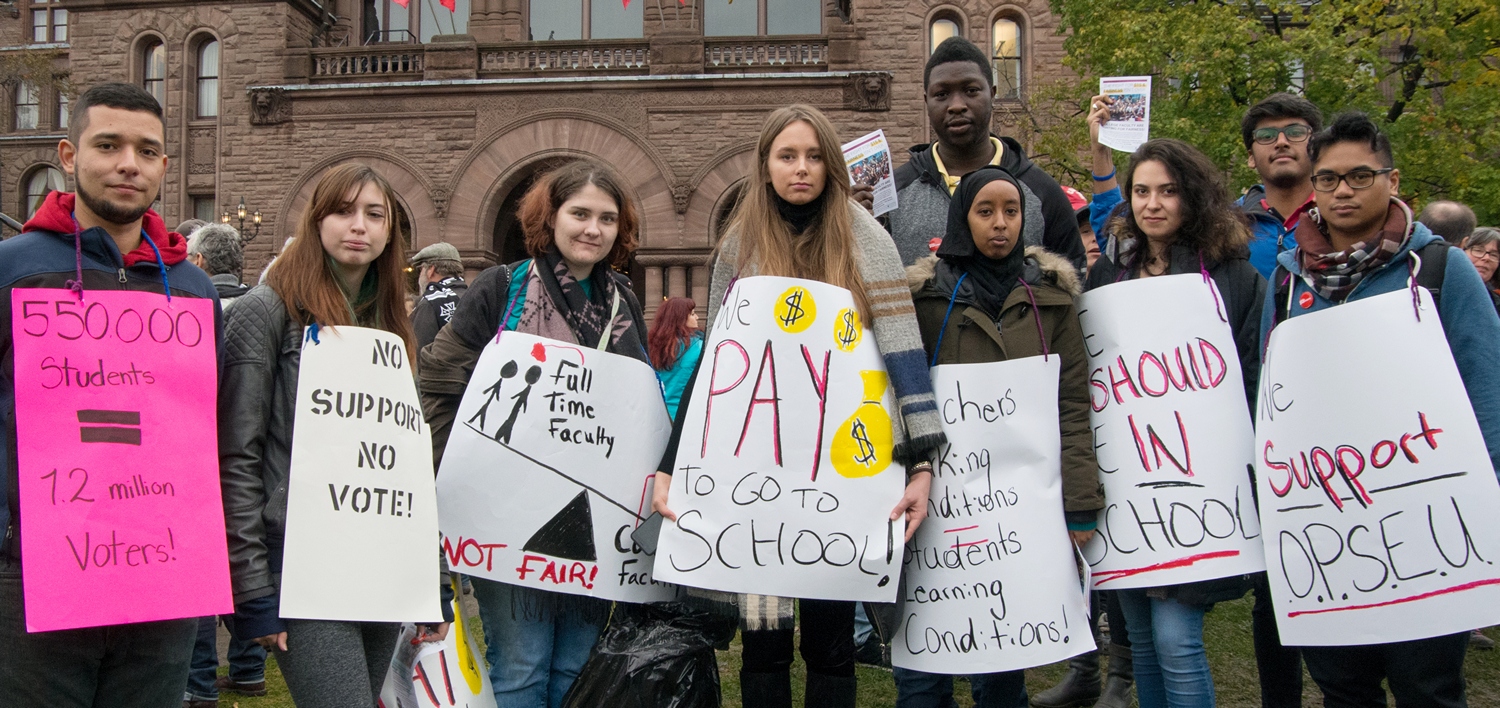
Group of students express support for faculty at November 2, 2017 rally.
Ontario's colleges have been underfunded for thirty
years. There
can be no solution to the crisis in the Ontario college system without
an increase in provincial funding for Ontario colleges to a Canadian
level. An increase in funding is not only necessary to provide a just
solution to the issue of contract employees and precarious work, it is
necessary to relieve Ontario college students from the burden of
tuition fees and debt and to provide the investment needed to prepare
our youth and those who need re-training to participate in the modern
workforce and to become full, conscious, participating members of
society.
 Ontario
college faculty have been fighting for an increase in funding for
college education commensurate with the needs of a modern society to
educate and train our youth since the first cutbacks of David Peterson.
They continued through the Rae Days and the 15 per cent
across-the-board cutbacks of Mike Harris and his Common
Sense Revolution. They faced the ‘Education Premier' Dalton McGuinty
and now Kathleen Wynne who has continued to starve funds for faculty
and students while encouraging privatization wherever possible. Ontario
college faculty have been fighting for an increase in funding for
college education commensurate with the needs of a modern society to
educate and train our youth since the first cutbacks of David Peterson.
They continued through the Rae Days and the 15 per cent
across-the-board cutbacks of Mike Harris and his Common
Sense Revolution. They faced the ‘Education Premier' Dalton McGuinty
and now Kathleen Wynne who has continued to starve funds for faculty
and students while encouraging privatization wherever possible.
The College Employer Council and the college presidents
have
declared that it would cost $250 million per year to fund
faculty's
proposals on contract employees and precarious work. This they say is
unaffordable and hence the faculty strike is unnecessary. Faculty are
told that they must limit their demands to whatever the Ontario
government and the College Employer Council find acceptable. This level
of funding is not even at the Canadian funding level let alone at that
resulting from a scientific assessment of the funding needs of Ontario
colleges.
The College Employer Council rejects the modern view
that putting
value into hiring new full-time faculty lifts up the entire college
education system adding enormous value to the economy and society.
Instead, the College Employers' Council seems determined to vilify
faculty and demonize them in the public eye as a cost, not a valuable
asset adding essential value to a modern society. The Council's
propaganda smells of ulterior motives to take value out of the college
system and put it elsewhere. At the very least, it does not show any
inclination on the part of college management to find a principled
settlement with faculty.
In 2013-14, Ontario funded its community colleges
at a rate of just
under $6,000 per student per year. The Canadian average was
slightly
over $10,000 per student per year, a difference of
approximately $4,000
per student per year. With approximately 250,000 full-time
students
underfunded at this rate, Ontario
colleges are underfunded at approximately one billion dollars per year
in comparison to what their funding would be if Ontario colleges were
funded at the national average. This figure is actually larger if the
funding requirements of part-time students are included. Ontario
faculty and students are entirely justified in demanding provincial
funding
at a Canadian level.
In 2014-2015, the Ontario government provided
only 44.4 per cent of
college revenues, down from 51.7 per cent in 2001. Only PEI
gave its
college students less in provincial government support than Ontario
in 2001 but PEI increased its support to 55 per cent
in 2015, leaving
Ontario as the
stingiest provincial jurisdiction in Canada. In 2014-2015,
government
funding as a share of total community college operating revenues
averaged 61.7 per cent in Canada. Quebec provided 85.4 per
cent of its
colleges' revenues. Kathleen Wynne and the Ontario Liberal government
have much explaining to do, as to why Ontario
supports its college students at a rate only slightly more than half
that of Quebec.
Provincial funding of Ontario community colleges at a
Canadian
level will also directly benefit Ontario college students. Ontario
college students pay the highest tuition fees in Canada and many come
out with significant debt, an average of more than $13,000 for a
two-year diploma program in 2013. Tuition, in Ontario, for
students in diploma programs, is $2,400 according to Colleges
Ontario,
rising to $6,100 per year for degree programs. In Quebec, tuition
at
CEGEPs is free for Quebec residents and only $1,300 for non-Quebec
residents. In Ontario, fees for international students are now
about $14,000 per year. Only 5.2 per cent
of Quebec college revenue came from tuition in 2014-2015
while 31.7 per
cent of the revenue of Ontario colleges came from the same source.
Funding Ontario colleges at a Canadian level will enable the reduction
or elimination of tuition fees at Ontario colleges; which even the
Liberal government has been admitting in the last few
years is needed with their 30 per cent off tuition and other
schemes.

Increased funding for Ontario colleges will also enable
them to
tackle the issue of deferred maintenance of buildings and instructional
equipment. In 2015-2016, this amounted to over $3,900 per
student for
the Ontario college system. For northern and small colleges, the
shortfall is much higher; $10,800 per student in
northern colleges and $9,300 in the small colleges. At current
rates of
underfunding, this shortfall will amount to $29,000 per student in
northern colleges and $27,300 per student in small colleges
by 2024-2025. There is a real need for investment in ancillary
services
such as mental health services, the demand for which
has been skyrocketing as the crisis in the colleges and in society as a
whole intensifies.
Community colleges are more directed to educating and
training
people for working class jobs, while universities are geared more to
training people in the professions. Initially tuition fees in Ontario
colleges were minimal but they have become significant. In Ontario,
there are far more part-time students than in Quebec. Could this be
that
inadequacies in funding cause higher tuition fees that cause more
students to have to work and study at the same time? This is delaying
the development of the human potential of Ontario society.
It is my opinion that the introduction of high tuition
fees into
Ontario colleges where working class youth must complete their
education and training at significant expense to themselves is a
breakdown in the social contract established in Ontario society (then
Canada West) before Confederation with Egerton Ryerson and the
introduction of
public education. Youth were guaranteed public education up to the
Grade 13 essentially free of charge. Youth completed their
training in
an apprenticeship system at the expense of the employer. This sufficed
for over a century. However, in the last third of the twentieth
century, employment paying adequate remuneration to support a
worker and family, increasingly required a college diploma. Now,
training does not take place with the employer in the workplace but in
the colleges. With the introduction of the community college system, a
large chunk of the cost of education and training was shifted to the
backs of students and their families and to the state, freeing the
employer from paying the cost of developing their workforce, while the
employer remains the main beneficiary of the increased labour capacity
that comes with advanced education and training.
To fund or not to fund public education is a political
decision.
The College Employer Council and the provincial government plead lack
of money and cite $250 million per year as the cost to fund
faculty's
proposals on contract employees and to end precarious work. This would
amount to $5 billion over 20 years.
Provincial underfunding at a $1 billion a year totals $20
billion over
twenty years. This amount of money would be required to increase
funding for Ontario colleges to bring it up to the Canadian level.
These are big sums and talk of big amounts of money are used to
intimidate faculty into giving up their job actions. However, let's
give this number some context. The Trudeau federal government announced
earlier this year a military procurement program entitled Strong,
Secure, Engaged in response to Trump's demand to increase
military spending of NATO countries to 2 per cent of their Gross
Domestic Product. Strong, Secure, Engaged
promises $550 billion over twenty years to purchase new military
hardware. If the federal government can find $550 billion to spend
on
non-productive military hardware, why can't the Ontario government
find $20 billion over twenty years to fund Ontario colleges at a
Canadian standard which will greatly contribute to the
development of the economy?

College education is not a cost to society. It is an
investment in
our future, in the future of our youth and in a modern society that
recognizes the rights of all. It is an investment in the human
potential of society. The College Employer Council bemoan the monies
necessary to fund a modern college system as a cost, as a loss to
society.
Education is primarily a people industry. It is
involved in the
transfer of knowledge and accumulated experience from one generation to
the next. For one generation to shortchange the next and starve them of
necessary investment in education is to commit a grave injustice to the
coming generation. For successive Ontario governments to
underfund Ontario colleges is to commit a crime against the next
generation. It goes against the grain of Canadians who wish to leave
the world a better place for their children and grandchildren.
College management does not seem to realize that
education is a
people process but treats it as an industrial process. To them, anyone
can be hired to teach a course at the last minute for the lowest price
possible. This attitude does not foster the hiring and retention of a
professional teaching corps; it encourages a fly-by-night mentality
among
contract employees who have to scurry around every few months to renew
their employment.
Ontario college faculty are on the right side of
history in their
struggle to recognize the rights of all and for an Ontario college
system that is funded at least to a Canadian level. An increase in
funding is not only necessary to provide a just solution to the issue
of contract employees and precarious work, it is necessary to relieve
Ontario college
students from the burden of tuition fees and debt and to provide the
investment needed to prepare our youth to participate in the modern
workforce and to become full, conscious, participating members of
society. The recognition of the right of faculty to participate in
academic decision-making is necessary to ensure that academic decisions
are
made in the interests of students and all members of the college
community and not in those of college management and the monopolies
they serve.
An Increase in Ontario College Funding
is Just and
Necessary for a
Modern Society!
Increase Funding for Ontario Colleges to a Canadian
Level!
It Can Be Done! It Must Be Done!
David Starbuck is a
retired Ontario community college teacher and the federal
Marxist-Leninist Party candidate in Sudbury. He taught technical
mathematics at Cambrian College in Sudbury for over 32 years. For
many years, David served as a steward and communication officer for the
faculty union, OPSEU Local 655. In his later years, the Cambrian
faculty members elected him to
defend their interests as the sole faculty representative on the
Cambrian College Board of Governors.

Statement of OPSEU College Faculty
Negotiating Team
- November 6, 2017 -
On November 1, Day 17 of the strike, the
College Employer Council (CEC) finally announced that they were
prepared to return to the bargaining table. While this was welcome news
at the time, their actions since returning indicate that this was
clearly a publicity stunt.
Today, instead of negotiating a fair settlement at the
table, Council has called for a forced vote on an offer that largely
peddles the same concessions that they have been pushing for months.
Instead of addressing the core issues of fairness and quality, Council
has put forward proposals that will have devastating negative
consequences on the
college system for generations to come. Council's actions, in forcing a
vote at this late date, are recklessly playing with students' lives,
and delaying any potential end to this strike.

Their forced offer vote:
- Attacks and undermines
Article 2 by excluding part-time workloads from consideration in
staffing grievances. It also doesn't allow locals to file staffing
grievances that include workload data for the past few years. This will
profoundly affect our capacity to get new full-time jobs.
- Establishes
an Academic
Freedom Letter of Understanding that is less than worthless and that
will enshrine the same policies that have given rise to the problem.
This is likely more harmful than no language at all.
- Undermines an
agreed-to taskforce that the union proposed by including as key
stakeholders parties that aren't bound by our Collective Agreement.
- Implements
specific provisions that will help Council evade its obligations to
contract faculty under Bill 148.
- Allows for unlimited overtime and
teaching weeks. This allows faculty to be pressured into unlimited
overtime, and also leads to fewer full-time hires and fewer contract
faculty positions.
- Seeks to narrow the definition of professional
development and increase management control over PD [professional
development].
- Attacks the
union's ability to have its members work for their union locals and on
the bargaining team. Includes the same deeply flawed Return to Work
protocol that saw over 1,400 unresolved grievances from
the 2006 strike.
When they called for this vote, only one no-cost
item remained: academic freedom, the right of faculty to make decisions
in our classrooms. We had negotiated to eliminate all immediate
monetary costs. We are .25 per cent apart on salary. This offer takes
us
backwards not forwards.
This forced offer vote is unnecessary, harmful and will
delay the end of the strike. We will be providing more information
shortly, but we will need to stand strong and reject this offer.
In solidarity,
The CAAT-Academic
Bargaining Team
For ongoing updates from OPSEU click here.

Queen's Park Rally Expresses Support
for Striking College Faculty

Some 5,000 striking college faculty, students and supporters rally at
Queen's Park,
November 2, 2017.
On November 2, the day that bargaining was set to
re-start between
the College Employer Council and the Ontario Public Services Employees
Union ( OPSEU), some 5,000 striking college faculty, students and
their
allies from around Ontario converged on Queen's Park to affirm their
resolve to stand together till a just and fair
contract is won. They came from Thunder Bay, Sault Ste. Marie, Toronto,
Windsor, Kingston, Oshawa and Ottawa, London and Barrie, Niagara and
elsewhere. Also present were representatives of other unions especially
those from the education sector as a whole.
The fighting spirit and unity of the college faculty
was everywhere
evident throughout the rally. Participants carried placards raising
their demands including for equal wages for full and part-time seasonal
faculty, and an end to faculty being forced to work from contract to
contract without benefits such as paid sick leave.

OPSEU President Warren (Smokey) Thomas, Ontario
Federation of
Labour President Chris Buckley and Canadian Association of University
Teachers President James Compton all addressed the rally. Compton noted
that what is going on in the university and college system in Ontario
is happening across Canada and also around the world.
Neo-liberal policies are being applied to post-secondary education
resulting in the lowering of the quality of education and the increased
use of part-time faculty. Compton read a message from Danish college
faculty to the rally expressing their support for the Ontario college
teachers. A similar message was also received from Australia.
Nour Alideeb, chairperson of the Ontario chapter of the
Canadian
Federation of Students stated that the college students were standing
firmly with their teachers because they understood clearly that their
learning conditions were directly linked to the wages and working
conditions of the faculty. Alideeb noted that college faculty worked
very
hard and that is was irresponsible and unacceptable for the Wynne
government to continue to under-fund the colleges and universities
jeopardizing the futures of all students in Ontario. She expressed the
broad unity of the college students and college faculty in a common
cause to ensure that the government funds education at all levels to
ensure
the highest quality of education for all students in Ontario. "It is
all of us or none of us," she declared.
More than 700 copies of a leaflet containing
articles reprinted from Workers' Forum
supporting the striking college workers were eagerly received. Many who
took the leaflet expressed appreciation for the articles and took
copies for their colleagues.

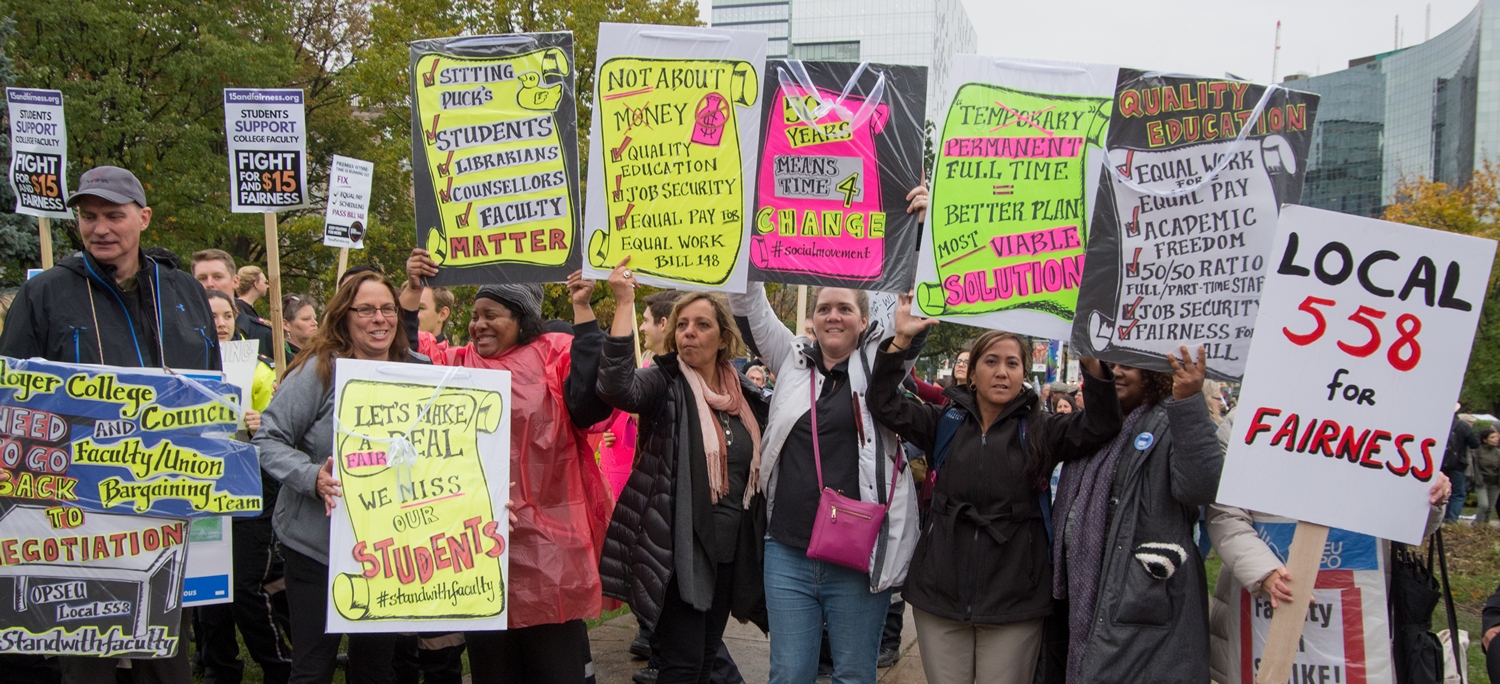
 
  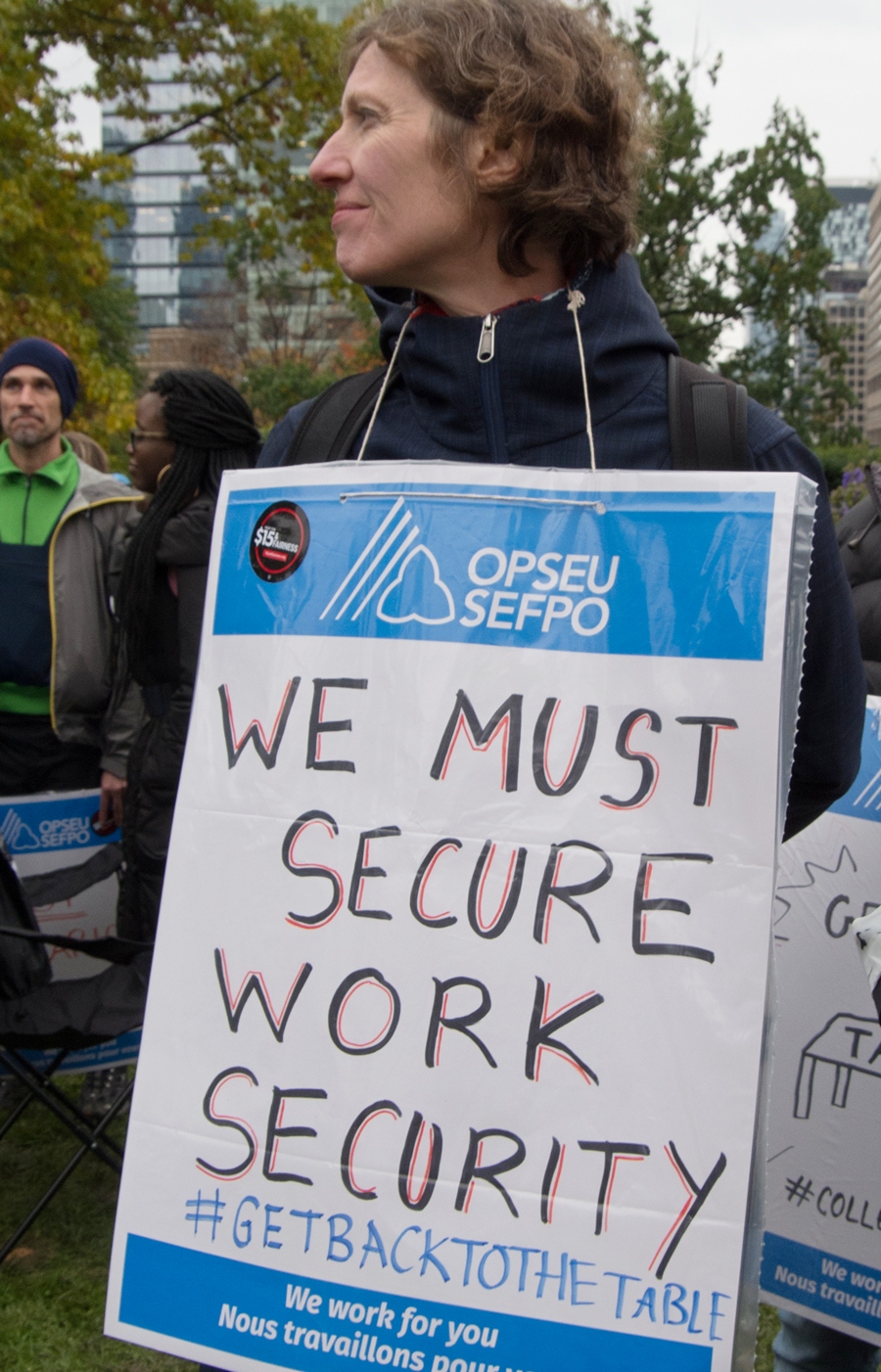
 
 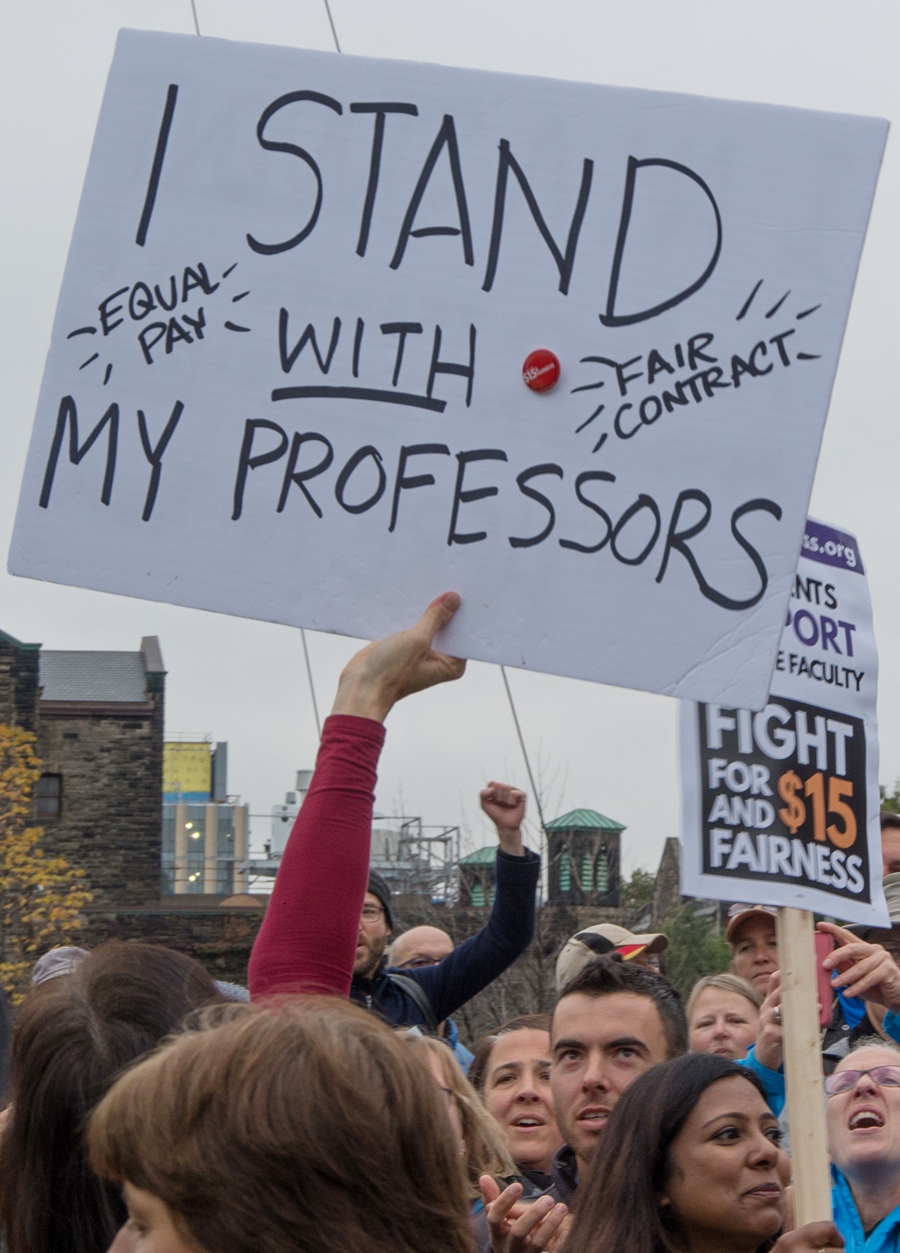 


PREVIOUS
ISSUES | HOME
Website: www.cpcml.ca
Email: office@cpcml.ca
|

